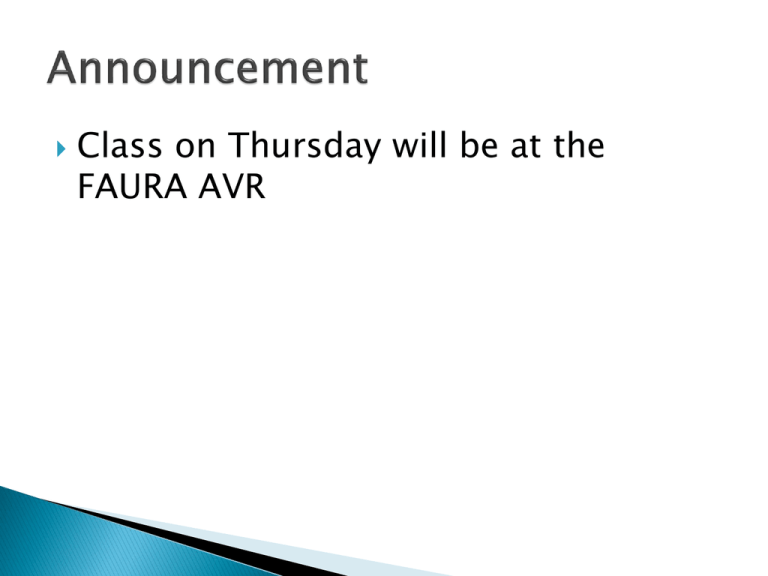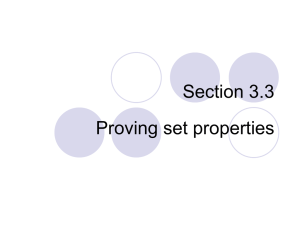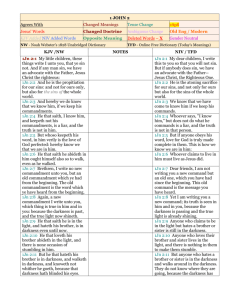Paradoxes of Faith (An Introduction)
advertisement

Class on Thursday will be at the FAURA AVR Explain this statement: “Relativism is self-refuting.” Class Standing(3 to 5 quizzes) 15% ◦ 20 points per quiz (minimum of 10 pts) ◦ Total 100 Two Reflection Papers Group Project Two Long Exams (Written/ Orals) Final Oral/ Written Exam 5% 10% 40% 30% __________ TOTAL= 100% There is no truth! Faith as a Response to a God who reveals Himself in Love What “authorities” do we rely on? •Jesus and His Disciples •The Church •The Bible Faith is a response to a God who reveals Himself in Love!! ) The Paradoxes of Faith (An Introduction ◦ An Introduction to the Paradoxes of Faith Certain and Obscure ◦ Faith as both Certain and obscure Certain enough to die for And yet a mystery ◦ Can you prove that God exists? : What does the bible say? Genesis 1: 1-26 Romans 1:18-25 Five Arguments to the Existence of God Certain yet Obscure Reasonable, yet Beyond Natural Reason Free yet Morally Obliging Particular Act yet Life Long Process Gift, yet Our Doing Personal and yet Ecclesial The convergence of opposites” (logic) a statement that contradicts itself • Ex. “Love-Hate” Relationship Certain, Yet Obscure Reasonable, yet beyond Reason Free, Yet Morally Obliging An Act, yet a Life Long Process A Gift, but Our Doing Personal, yet Ecclesial An Act, yet a Life Long Process A Gift, but Our Doing Certain, Yet Obscure Free, Yet Morally Obliging Reasonable, yet beyond Reason Personal, yet Ecclesial Certain enough to die for… ◦ Rev 12:11 And they have conquered him by the blood of the Lamb and by the word of their testimony, for they loved not their lives even unto death. Yet a “mystery” because like love, there is always more to understand about our faith Faith does not conflict with reason. Human beings have the capacity to have faith because they have the ability to reason. Yet, natural reason is not enough. We need God to enlighten us! Again Jesus spoke to them, saying, "I am the light of the world. Whoever follows me will not walk in darkness, but will have the light of life." (Joh 8:12) The condition of being free; the power to act or speak or think without externally imposed restraints This can mean our basic tendency toward the good, the "voice always summoning us to love the good and avoid evil." CFC 701 ...conscience acts as "the proximate norm of personal morality" (Veritatis Splendor 60) for discerning good and evil (cf. CCC 1796). CFC 701 Example: Mother and Father Story “You are meant to love freely and yet you are obliged to express that love.” Mt. 11: 25-27 Mt. 11:25-27--At that time Jesus said in reply, 14 "I give praise to you, Father, Lord of heaven and earth, for although you have hidden these things from the wise and the learned you have revealed them to the childlike. 26 Yes, Father, such has been your gracious will. 27 All things have been handed over to me by my Father. No one knows the Son except the Father, and no one knows the Father except the Son and anyone to whom the Son wishes to reveal him. 28 15 "Come to me, all you who labor and are burdened, 16 and I will give you rest. 29 17 Take my yoke upon you and learn from me, for I am meek and humble of heart; and you will find rest for your selves. 30 For my yoke is easy, and my burden light." Faith is an individual act that would entail perseverance, i.e. a life long process. 1Jn 1:1-4 That which was from the beginning, which we have heard, which we have seen with our eyes, which we looked upon and have touched with our hands, concerning the word of life (2) the life was made manifest, and we have seen it, and testify to it and proclaim to you the eternal life, which was with the Father and was made manifest to us(3) that which we have seen and heard we proclaim also to you, so that you too may have fellowship with us; and indeed our fellowship is with the Father and with his Son Jesus Christ. (4) And we are writing these things so that our joy may be complete. 1Jn 1:1-4 That which was from the beginning, which we have heard, which we have seen with our eyes, which we looked upon and have touched with our hands, concerning the word of life (2) the life was made manifest, and we have seen it, and testify to it and proclaim to you the eternal life, which was with the Father and was made manifest to us(3) that which we have seen and heard we proclaim also to you, so that you too may have fellowship with us; and indeed our fellowship is with the Father and with his Son Jesus Christ. (4) And we are writing these things so that our joy may be complete. 1Jn 1:1-4 That which was from the beginning, which we have heard, which we have seen with our eyes, which we looked upon and have touched with our hands, concerning the word of life (2) the life was made manifest, and we have seen it, and testify to it and proclaim to you the eternal life, which was with the Father and was made manifest to us(3) that which we have seen and heard we proclaim also to you, so that you too may have fellowship with us; and indeed our fellowship is with the Father and with his Son Jesus Christ. (4) And we are writing these things so that our joy may be complete. ◦ First, there is the question of whether something exists or not. ◦ Second, there is the question of whether we know it exists. ◦ Third, there is the question of whether we have a reason for our knowledge. ◦ Fourth, there is the question of whether this reason, if it exists, amounts to a proof. ◦ Fifth, if there is a proof, is it a scientific proof, a proof by the scientific method, i.e., by experiment, observation, and measurement? Fourth, there is the question of whether this reason, if it exists, amounts to a proof. Most reasons do not. Most of the reasons we give for what we believe amount to probabilities, not proofs. Fifth, if there is a proof, is it a scientific proof, a proof by the scientific method, i.e., by experiment, observation, and measurement? Philosophical proofs can be good proofs, but they do not have to be scientific proofs. Can you prove God exists? What does the bible say? Gen. 1: 1-26 Rom. 1: 18-25 In the beginning God created the heavens and the earth. The earth was without form and void, and darkness was upon the face of the deep; and the Spirit of God was moving over the face of the waters. (Gen 1:1-2) For what can be known about God is plain to them, because God has shown it to them. Ever since the creation of the world his invisible nature, namely, his eternal power and deity, has been clearly perceived in the things that have been made. So they are without excuse; (Rom 1:19-20) The The The The The Argument Argument Argument Argument Argument from from from from from design Motion Existence death goodness “ Brain Test” …could the design that obviously now exists in man and in the human brain come from something with less or no design? Such an explanation violates the principle of causality, which states that you can't get more in the effect than you had in the cause. If there is intelligence in the effect (man), there must be intelligence in the cause.. Peter Kreeft , Argument of Design And only where God is seen does life truly begin. Only when we meet the living God in Christ do we know what life is. We are not some casual and meaningless product of evolution. Each of us is the result of a thought of God. Each of us is willed, each of us is loved, each of us is necessary. There is nothing more beautiful than to be surprised by the Gospel, by the encounter with Christ. There is nothing more beautiful than to know Him and to speak to others of our friendship with Him. Not an Accidernt Willed Loved Necessary Chris: Who started the Big Bang? Sal: That’s not a scientific question Chris: Exactly. And therefore science has no answer to it. But religion does. It is not a scientific question not because it is not about the real world—it is– but because science can’t answer a question about God, Who’s outside the universe, just by looking at the inside of the universe Debate Statement: God exists because the universe exists.








